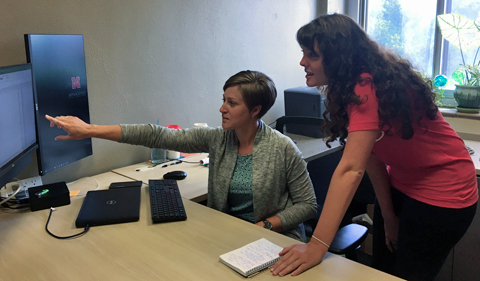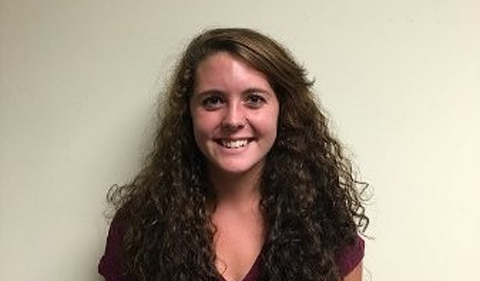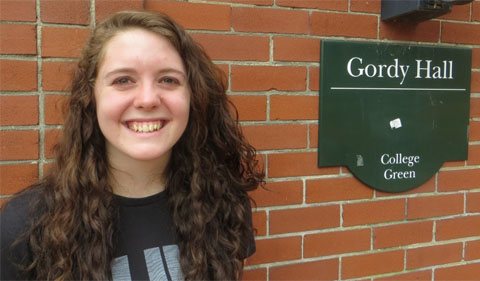Editor’s Note: The Happy Beginnings series features recent College of Arts & Sciences graduates who are getting started in careers, graduate school and service.
Early in her college planning, Casey Tisdale ’17 thought of becoming a behavioral analyst for the FBI. By the time she was a senior, she became passionate about wrongful convictions and the factors that influence juror decision making.
Now she’s in graduate at the University of Nebraska-Lincoln, building on her experiences in the psychology FEAR lab at Ohio University. She’s working toward a Ph.D. in Social Psychology and a Master of Legal Studies at the University of Nebraska-Lincoln.
“This provides me with the opportunity to attend graduate school and law school, for which I’m excited (nervous) and extremely grateful. The law education will embolden my understanding of the legal system and help me develop psychological studies and policy that will hopefully address some of the injustices perpetuated in the legal system. I will continue to study factors that affect legal decision-making and learn how we can better the system for all,” she says.
A Sociology-Criminology and Psychology double major, Tisdale spent her junior and senior year in the FEAR Lab, which stands for Factors of Affective and Emotional Risk. The lab uses virtual reality to try to help people with anxiety and mood disorders.
“Anxiety disorders are a really big problem in the U.S.” says Tisdale, who was a FEAR Lab project manager. “A big problem with clinical psychology is a lot of measures are self-report and give way to self-report bias (where people will report their own symptoms to be viewed a certain way instead of how they actually are). We were trying to see if there were any symptoms of anxiety that would produce a biological change, that way we can look into using biometrics instead of self-report with anxiety and hopefully get more honest responses.”
Making People Anxious in the Lab
In order to study anxiety, researchers have to provoke feelings of anxiety in the lab. They do this through a virtual reality task in which participants are asked to give a five-minute speech about their greatest weakness to a room of people staring at them.
While this would be enough to make many people’s palms start to sweat, researchers up the ante with several other techniques. Participants are given a pill containing either niacin (vitamin B3, an irritating, yet generally harmless, compound that causes bright red flushing of the face and arms) or a placebo, and a small device is placed on their finger that vibrates occasionally during the virtual reality task.
With the virtual reality headset on, “it looks like you’re in a conference room with some people staring you. We even have sound effects, like people coughing and clearing their throats,” Tisdale said of the study run by Dr. Nicholas Allan, Assistant Professor of Clinical Psychology.
“The study uses physiological measures, such as heart rate and amount of sweat, to measure anxiety, instead of just relying on what participants tell us,” Tisdale said. “We also judge them based on their physically observable anxiety during their speech.”
‘I Wasn’t Sure about Graduate School’
“Everyone should join a lab, especially if you’re thinking of graduate school. It is not a huge time commitment, and every professor will work with you and make sure that it fits your schedule. I remember someone telling me that I should (join a lab) and being like, ‘Eh, I’m not sure about grad school,’ but it’s honestly one the best things I’ve done.”
“I feel like OHIO prepared me well for graduate school. I was taking challenging coursework, talking to professors, and being active. I talked to one of my professors about wanting to do something with the legal field and she was like, “Here are all these resources. If you have any questions, I’ll make myself available. I’ll be here for you.’”
Tisdale, also earned the Law, Justice & Culture Certificate, also spent time working in diversion programs at the Athens County Municipal Court. Diversion programs help people change the behavior that led to their arrest.
She was a student worker in the Center for Law, Justice and Culture, an executive board member of Ohio University Mock Trial, and a member of both Students Defending Students and Phi Alpha Delta, the pre-law fraternity.






















Comments